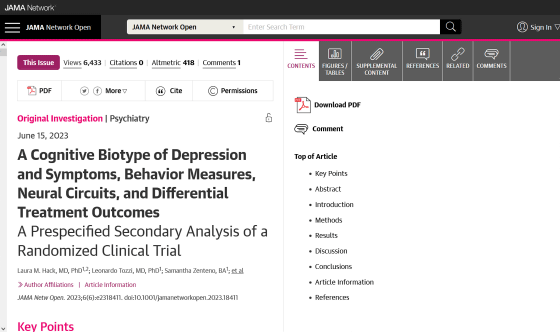Is there a reason why some patients do not respond to standard drug therapy, where a ``cognitive biotype'' that applies to about 27% of depressed patients is discovered?

A Cognitive Biotype of Depression and Symptoms, Behavior Measures, Neural Circuits, and Differential Treatment Outcomes: A Prespecified Secondary Analysis of a Randomized Clinical Trial
https://doi.org/10.1001/jamanetworkopen.2023.18411

Stanford Medicine-led research identifies a subtype of depression | News Center | Stanford Medicine
https://med.stanford.edu/news/all-news/2023/06/depression-subtype.html
A New Subtype of Depression Has Been Identified, And It Could Affect 27% of Patients : ScienceAlert
https://www.sciencealert.com/a-new-subtype-of-depression-has-been-identified-and-it-could-affect-27-of-patients
Since depression has traditionally been considered a ``mood disorder'', selective serotonin reuptake inhibitors (SSRIs) , which target serotonin , a neurotransmitter involved in mental stability, are prescribed as treatments. It is common to
However, some patients do not respond well to treatment of depression with SSRIs, and past studies have shown that as many as a quarter of depressed patients treated with antidepressants had significant problems on cognitive tests even after treatment. is known to be seen.

Therefore, the research team decided to actually treat a large number of subjects with antidepressants and measure the remission rate and changes in cognitive function before and after treatment. First, 1,008 depressed patients who had never been treated with antidepressants in the past were administered
Subsequently, 712 patients who completed the 8-week treatment program were measured for improvement in depressive symptoms, quality of life, and recovery of social skills before and after treatment. In addition, the subjects also completed a series of cognitive tests that measure items such as verbal memory, working memory, decision speed, and attention span before and after treatment.
An additional 96 subjects were asked to press a button when a green 'GO' appeared on the display, while scanning their brain activity with functional magnetic resonance imaging (fMRI) , and when a red 'No Go' appeared, We asked them to do a 'Go/No-go task' to avoid pressing buttons.

As a result of the analysis, 27% of the subjects had noticeable symptoms related to cognitive function, such as 'cognitive decline and insomnia, cognitive decline on behavioral tests, and reduced activity in specific brain regions of the frontal lobe.' It turns out.
Patients with this depression biotype, which the research team calls the 'cognitive biotype,' showed better
In addition, it was found that the depression remission rate for the three antidepressants used in this study was 47.7% in non-cognitive biotype patients, compared to 38.8% in cognitive biotype patients. . In particular, with Zoloft, the remission rate was 50% in people without cognitive biotypes, but it was only 35.9% in some people.

'This study is very important because psychiatrists have few tools to measure depression to help guide treatment decisions,' said lead author Laura Hack, an assistant professor at Stanford University. 'Measuring tools are mostly observational and self-reported, and imaging while performing cognitive tasks is novel in depression treatment research.'
The research team believes that behavioral measurements and imaging may help diagnose depression biotypes, leading to better treatments. However, although previous research has shown that there are more than a dozen biotypes of depression, all patients continue to receive roughly the same treatment, ``depending on the patient's biotype''. The challenge for the future is to understand how we should change the treatment method.
For example, guanfacine , which targets the dorsolateral prefrontal cortex, may be more effective than other antidepressants in patients with cognitive biotypes. In future research, he plans to investigate the effects of drug therapy, magnetic stimulation therapy, cognitive behavioral therapy, etc. for patients with cognitive biotypes.
Mr. Hack pointed out that depressed patients suffer even while trial and error of treatment methods, and in some cases they commit suicide when treatment is prolonged. 'This is because we start with drugs that have the same mechanism of action for all patients, even though depression is different. I think this study will help change that,' Huck said. said Mr.
Related Posts:
in Science, Posted by log1h_ik







